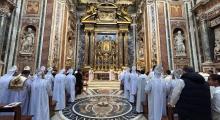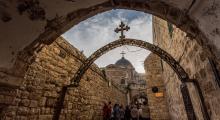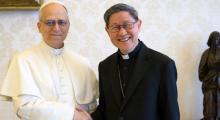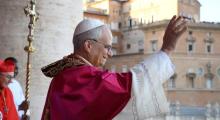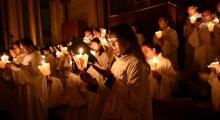Issued by the Catholic Center for Studies and Media - Jordan. Editor-in-chief Fr. Rif'at Bader - موقع أبونا abouna.org
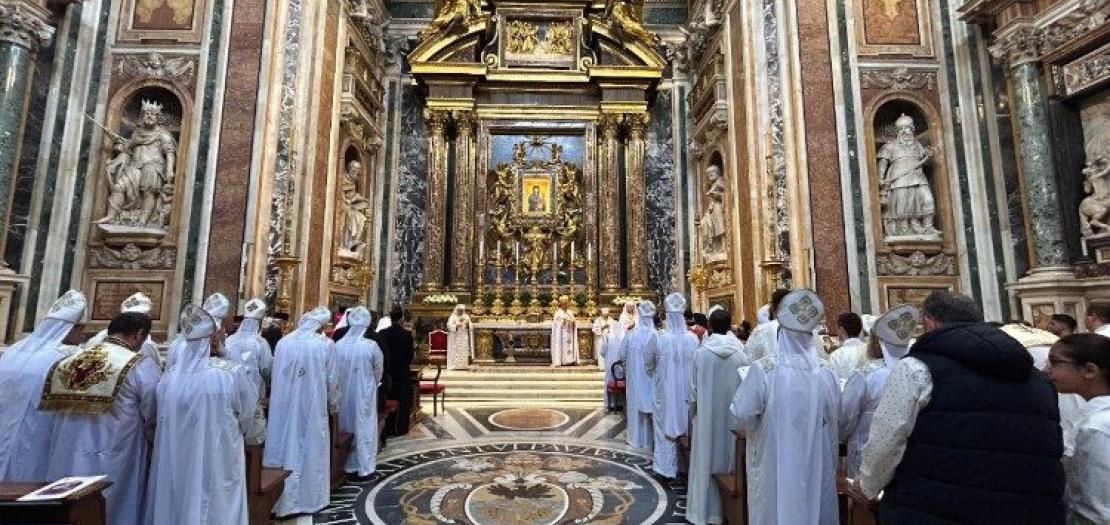
The Divine Liturgy in the Coptic Rite at St. Mary Major on the occasion of the Jubilee of the Eastern Churches
A penitential dimension, intercessory prayer, and monastic tradition—these were the hallmarks of the Coptic Divine Liturgy celebrated this afternoon, May 12, in the Pauline Chapel of the Basilica of St. Mary Major, right beside the tomb of Pope Francis.
The celebration was presided over by His Beatitude Ibrahim Isaac Sedrak, Patriarch of Alexandria of the Catholic Copts and President of the Assembly of Patriarchs and Bishops of Egypt.
Also present were Cardinal Claudio Gugerotti, Prefect of the Dicastery for the Eastern Churches; his personal secretary, Father Emanuel Sabadakh; and Archbishop Filippo Ciampanelli, Undersecretary of the same Dicastery.
Important moment for the Jubilee
This Divine Liturgy was celebrated on the occasion of the Jubilee of the Eastern Churches, which will culminate with an audience with Pope Leo XIV on Wednesday, May 14.
With the arrival of Christianity in Egypt, “Copt” came to mean “Egyptian Christian,” referring to those who remained Christian after the Arab conquest of Egypt. It was to these people, who endured great suffering and martyrdom, that the Cardinal turned his attention today, exalting their courage and their profound value.
The Cardinal highlighted the martyrdom suffered by the Copts and by other Catholics of Eastern rites. “You are very experienced in martyrdom,” Cardinal Gugerotti said. “You’ve had many martyrs, and even recently, some Copts were killed and became known only because they happened to be recognized. Others remained unknown.”
The Cardinal spoke of the “passionate history” of this Church, which can be seen in its ancient roots and diversity, in its monasticism that spread across the world, in the uniqueness of its liturgy, and also in the many sufferings endured throughout the history of their land. Yet, despite all of this, “you remained.”
Cardinal Gugerotti pointed to certain reasons why these Christians managed to survive and were not uprooted from their homeland.
A wisdom born of the blood of martyrdom
On behalf of the entire Catholic Church, the Cardinal Prefect thanked them for their steadfast witness: “My role, from brother to brother,” he stressed, “is to tell you that this is your home. When you pass through the Holy Door and when you pray—as you did at the start of this celebration—you can be proud of how these prayers resonate in the capital.”
He also exhorted them to "pray with intensity, because you too need hope. Everywhere we look, we feel surrounded by the possibility of evil. But we will come to ask you how you managed to survive. These have been terrible years—years of massacres—but you made it. Perhaps it was the blessing of the Holy Family of Egypt, or the great saints and theologians, or a deep identification with the land of Egypt from which your name and your deep faith come—faith that moved mountains. Perhaps it was the tireless work of creating a Coptic Church. The fact is, there is a wisdom in your blood that is precisely the fruit of your blood.”
A precious part of the Church
Cardinal Gugerotti invoked the Lord’s protection “from new difficulties,” so that the Copts’ belonging to the Catholic Church would not only be a source of pride but also reflect a sense of being a precious part of the global Catholic community. He offered reassurance that the Church “cares” about them.
He also encouraged their important mission: “Be yourselves. Within the Catholic Church, you preserve a unique spiritual experience. God does not count how many people are present—He counts the quality of their presence. This Jubilee,” he emphasized, “should be an occasion for holiness, so that this holiness, like martyrdom, may be an experience that purifies the Church.”
In memory of the late Pope Francis, and praying for our Pope Leo XIV
The memory of the late Pope Francis was explicit in both the Cardinal’s and the Patriarch’s words, as were their hopes for the new Successor of Peter, who will receive members of the Eastern Churches in audience during their Jubilee celebrations from today through Wednesday, May 14.
His Beatitude Sedrak, in deep spiritual communion with the faithful in Egypt and those in the diaspora, spoke of Pope Francis as a “pastor of wisdom who reached wounded hearts in the Church and in humanity, starting from places of fragility. Thanks to his pontificate, many breathed the air of the Gospel.”
He then gave thanks for Pope Leo XIV, and offered the prayer that “the Holy Spirit may guide him as He guided Saint Peter in the early Church.”
Hope for a planet freed from the greed of profit
The Patriarch strongly emphasized Pope Francis’s efforts toward “reconciliation with our common home”—a direction they intend to continue pursuing with determination.
In particular, he echoed the words of the UN Secretary-General in describing the planet as a “boiling world,” stressing that it does not need illusions but rather authentic hope—hope that does not anesthetize but liberates, “hope that pushes us to react by overcoming the greed of profit and unchecked globalization.”
Hope in world peace
“In the world today, values have become confused. Fear, isolation, and existential anguish dominate—even becoming daily experiences for the faithful,” the Patriarch observed.
Yet, he offered reassurance, saying, “God acts even amid suffering and challenges. Hope drives us to renew our world without surrendering to injustice.”
He expressed his hope that we may build societies that are more just and sustainable and embrace “an economy of life, not of death.”
United in the spirit of the Council of Nicaea
Finally, he offered a reflection on the upcoming 1700th anniversary of the Ecumenical Council of Nicaea—a milestone in the Church’s history, where Saint Athanasius made a crucial contribution in defending the divinity of Christ. “This calls us to remain firm in our faith with courage and wisdom and to be, in turn, witnesses of Christ.”
His Beatitude Sedrak concluded by entrusting to God his prayer that the Church, guided by the new Holy Father, may remain on this 'one,' 'holy,' 'catholic,' and 'apostolic' path.


